Penn State’s Evidence-to-Impact Collaborative co-hosts international forum with the White House
Published May 12, 2023
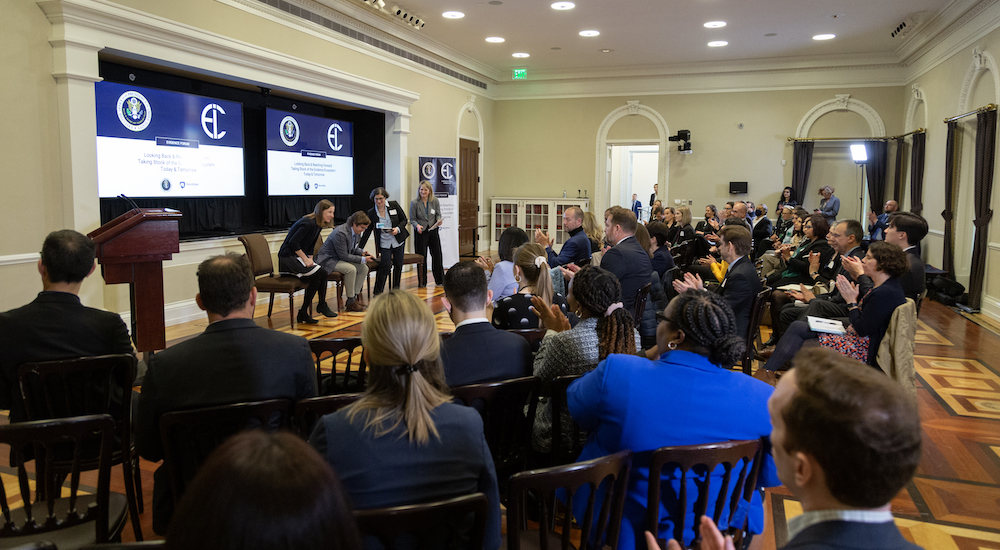
eic-featured-image-2
Washington D.C. — The Year of Evidence Forum held at the White House gathered scholars from higher education, federal agencies, private industry, and non-profit organizations from the U.S. and Canada who focus on evidence-based research to improve health, safety, equity, and prosperity. The White House Office of Science and Technology Policy, the White House Office of Management and Budget, and Penn State’s Evidence-to-Impact Collaborative co-hosted the event. Though this was the final of the scheduled series, more work is needed.
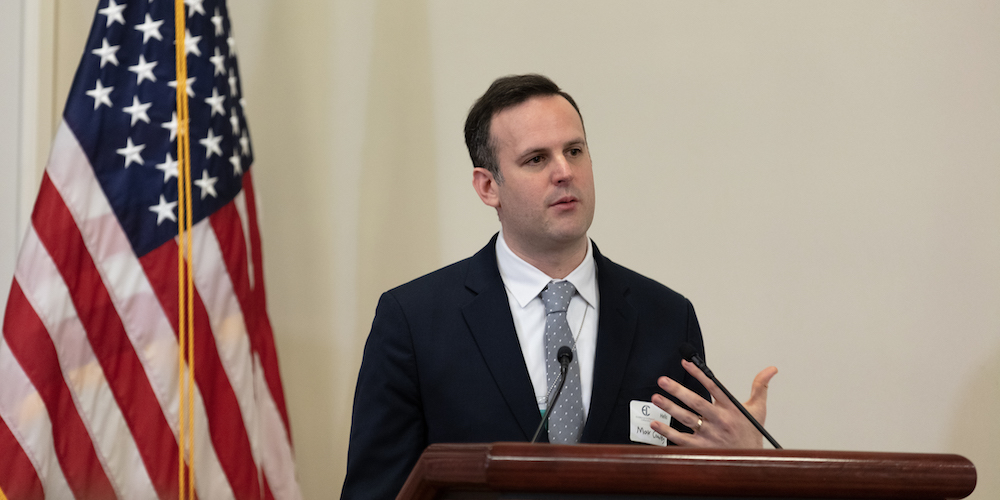
max-crowley
Max Crowley, Ph.D. Director, Evidence-to-Impact Collaborative (EIC)
“This is not the end but, in fact, the beginning of new opportunities for the evidence community and the role of science in our society,” said Max Crowley, the director of the Evidence-to-Impact Collaboration. Crowley, who moderated the forum. He also called for equity “as a through-line” in all components of this work.
The theme, Looking Back and Reaching Forward, guided this year’s forum. Nearly 300 people participated in person and virtually as a dozen speakers looked back on the evidence community’s contributions. Reaching forward, speakers stressed the need for diversity in the research community and to strengthen researcher collaboration. Each speaker also discussed methods for gathering and helping implement scientific evidence in policymaking and encouraged greater community involvement and outreach from those directly involved in each issue.
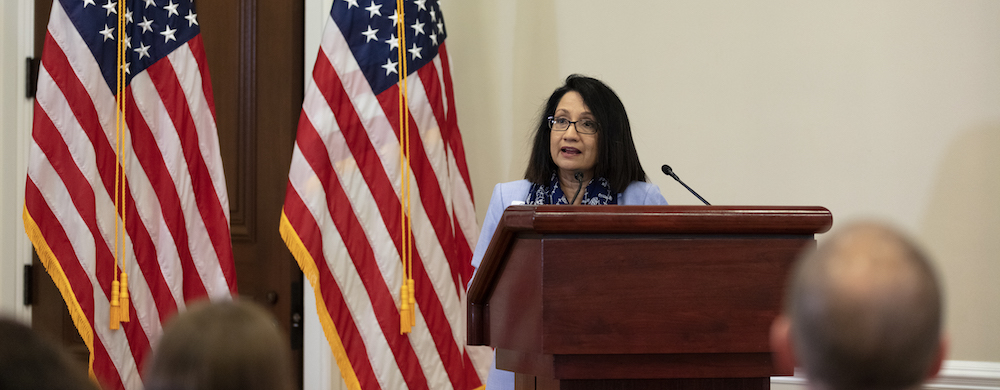
president-neeli-bendapudi
Neeli Bendapudi, President of Penn State
The President of Penn State, Neeli Bendapudi, highlighted higher education’s contributions to the evidence ecosystem. “Penn State prides itself on being a leader in research evidence and in the community. Researchers need to continue seeking future teaching and research opportunities and working to establish trust in science. We must look at the whole picture of equity and include community “citizen scientists.” “Instead of asking ‘why are students failing in school,’ we need to ask, ‘why is the school failing the student.’ We all need to be held accountable for results.” In addition, she called for researchers and policymakers to “move from evidence to action.”
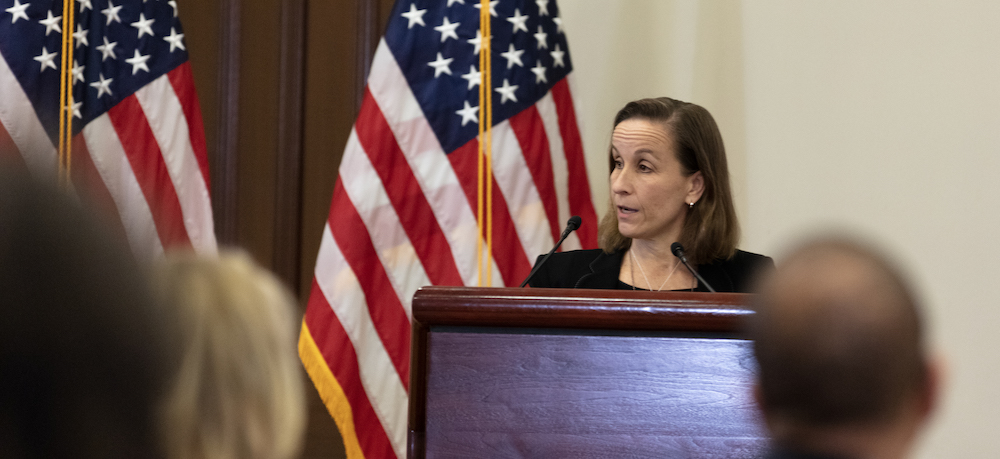
laura-jana
Laura Jana, Ph.D. Chief Innovation Officer, Evidence-to-Impact Collaborative (EIC)
Laura Jana, Chief Innovation Officer of the Evidence-to-Impact Collaborative and adjunct faculty member of the Edna Bennett Pierce Prevention Research Center, encouraged researchers and policymakers to learn to speak each other’s language for better impact. In her work with the business community, she sees the need to recognize “compassionate capitalism” with a focus on employees, communities, the entirety of the supply chain, and ethical practices, especially regarding diversity and inclusion.
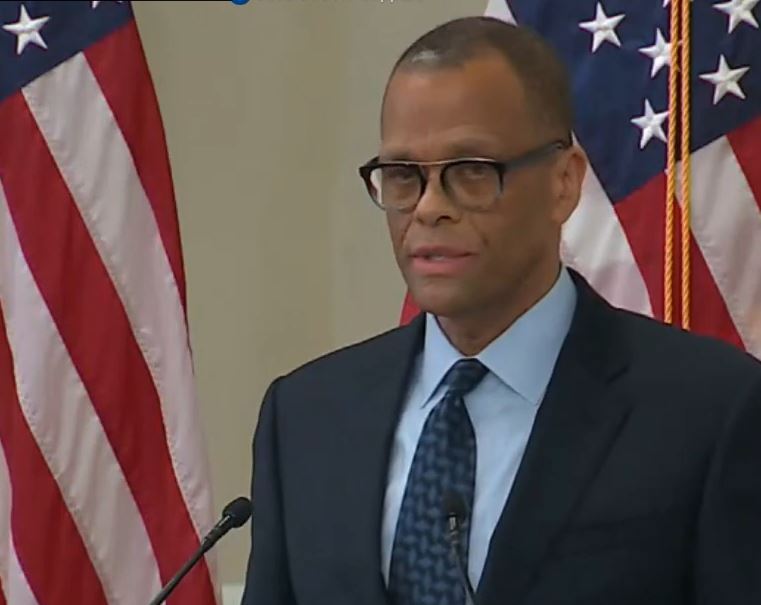
Philip Gaskin copy
Philip Gaskin, VP of Entrepreneurship for the Ewing Marion Kauffman Foundation
Philip Gaskin, VP of Entrepreneurship for the Ewing Marion Kauffman Foundation, a funder for Penn State’s Evidence-to-Impact Collaborative, reminded researchers not only to study what worked well in the past but also to look forward. He noted the need to spot trends in the economy and work ahead of the curve by studying those who are succeeding, those who are trying, those who failed, and those who are excluded. This broad approach can help make systems-level changes to support entrepreneurs in the coming years, said Gaskin.
Max Crowley called for those who generate science and those who use it to collaborate locally and globally to build “durable relationships.” He said that there is a “replicable science to scientific impact” and it’s all about building and maintaining relationships.
Collaborative efforts continue with the White House, the Evidence-to-Impact Collaborative, and other partners to motivate the groundswell of support for these efforts to produce, translate, and implement science.
Other speakers included the Second Gentleman Douglas Emhoff, the keynote speaker; Kei Koizumi, Principal Deputy Director for Policy at the White House Office of Science and Technology Policy; Matt Soldner, Commissioner of the National Center for Education Evaluation and Regional Assistance at the U.S. Dept. of Education; Jennifer Thornhill Verma, Executive Lead at the Global Commission of Evidence on Address Societal Challenges; Lauren Supplee, Deputy Assistant Secretary for Planning, Research and Evaluation at the U.S. Department of Health and Human Services; Angela Bednarek, Project Director for the Evidence Project at The Pew Charitable Trusts; Erica Goldman, Director for Science Policy at the Federation of American Scientists; David Yokum, Director at the Policy Lab at Brown University; and Diana Epstein, the Evidence Team Lead at the White House Office of Management and Budget.
The Evidence-to-Impact Collaborative (EIC) is a research center and core resource for the science of scientific impact — aiming to improve the relevance, value, and use of research evidence to increase societal well-being. The EIC leverages expertise in administrative data, program design and evaluation, and researcher-policymaker relationships to optimize public and private investments. The EIC is a unit of Penn State’s Social Science Research Institute supported by the College of Health and Human Development.
For more info about the Evidence Forum, or to watch the recording, visit https://evidence2impact.psu.edu/evidence-forum/
Penn State’s Evidence-to-Impact Collaborative co-hosts international forum with the White House
May 12, 2023

Washington D.C. — The Year of Evidence Forum held at the White House gathered scholars from higher education, federal agencies, private industry, and non-profit organizations from the U.S. and Canada who focus on evidence-based research to improve health, safety, equity, and prosperity. The White House Office of Science and Technology Policy, the White House Office of Management and Budget, and Penn State’s Evidence-to-Impact Collaborative co-hosted the event. Though this was the final of the scheduled series, more work is needed.

max-crowley
Max Crowley, Ph.D. Director, Evidence-to-Impact Collaborative (EIC)
“This is not the end but, in fact, the beginning of new opportunities for the evidence community and the role of science in our society,” said Max Crowley, the director of the Evidence-to-Impact Collaboration. Crowley, who moderated the forum. He also called for equity “as a through-line” in all components of this work.
The theme, Looking Back and Reaching Forward, guided this year’s forum. Nearly 300 people participated in person and virtually as a dozen speakers looked back on the evidence community’s contributions. Reaching forward, speakers stressed the need for diversity in the research community and to strengthen researcher collaboration. Each speaker also discussed methods for gathering and helping implement scientific evidence in policymaking and encouraged greater community involvement and outreach from those directly involved in each issue.

president-neeli-bendapudi
Neeli Bendapudi, President of Penn State
The President of Penn State, Neeli Bendapudi, highlighted higher education’s contributions to the evidence ecosystem. “Penn State prides itself on being a leader in research evidence and in the community. Researchers need to continue seeking future teaching and research opportunities and working to establish trust in science. We must look at the whole picture of equity and include community “citizen scientists.” “Instead of asking ‘why are students failing in school,’ we need to ask, ‘why is the school failing the student.’ We all need to be held accountable for results.” In addition, she called for researchers and policymakers to “move from evidence to action.”

laura-jana
Laura Jana, Ph.D. Chief Innovation Officer, Evidence-to-Impact Collaborative (EIC)
Laura Jana, Chief Innovation Officer of the Evidence-to-Impact Collaborative and adjunct faculty member of the Edna Bennett Pierce Prevention Research Center, encouraged researchers and policymakers to learn to speak each other’s language for better impact. In her work with the business community, she sees the need to recognize “compassionate capitalism” with a focus on employees, communities, the entirety of the supply chain, and ethical practices, especially regarding diversity and inclusion.

Philip Gaskin copy
Philip Gaskin, VP of Entrepreneurship for the Ewing Marion Kauffman Foundation
Philip Gaskin, VP of Entrepreneurship for the Ewing Marion Kauffman Foundation, a funder for Penn State’s Evidence-to-Impact Collaborative, reminded researchers not only to study what worked well in the past but also to look forward. He noted the need to spot trends in the economy and work ahead of the curve by studying those who are succeeding, those who are trying, those who failed, and those who are excluded. This broad approach can help make systems-level changes to support entrepreneurs in the coming years, said Gaskin.
Max Crowley called for those who generate science and those who use it to collaborate locally and globally to build “durable relationships.” He said that there is a “replicable science to scientific impact” and it’s all about building and maintaining relationships.
Collaborative efforts continue with the White House, the Evidence-to-Impact Collaborative, and other partners to motivate the groundswell of support for these efforts to produce, translate, and implement science.
Other speakers included the Second Gentleman Douglas Emhoff, the keynote speaker; Kei Koizumi, Principal Deputy Director for Policy at the White House Office of Science and Technology Policy; Matt Soldner, Commissioner of the National Center for Education Evaluation and Regional Assistance at the U.S. Dept. of Education; Jennifer Thornhill Verma, Executive Lead at the Global Commission of Evidence on Address Societal Challenges; Lauren Supplee, Deputy Assistant Secretary for Planning, Research and Evaluation at the U.S. Department of Health and Human Services; Angela Bednarek, Project Director for the Evidence Project at The Pew Charitable Trusts; Erica Goldman, Director for Science Policy at the Federation of American Scientists; David Yokum, Director at the Policy Lab at Brown University; and Diana Epstein, the Evidence Team Lead at the White House Office of Management and Budget.
The Evidence-to-Impact Collaborative (EIC) is a research center and core resource for the science of scientific impact — aiming to improve the relevance, value, and use of research evidence to increase societal well-being. The EIC leverages expertise in administrative data, program design and evaluation, and researcher-policymaker relationships to optimize public and private investments. The EIC is a unit of Penn State’s Social Science Research Institute supported by the College of Health and Human Development.
For more info about the Evidence Forum, or to watch the recording, visit https://evidence2impact.psu.edu/evidence-forum/
More News
LET’S STAY IN TOUCH
Join the Evidence-to-Impact Mailing List
Keep up to date with the latest resources, events, and news from the EIC.



